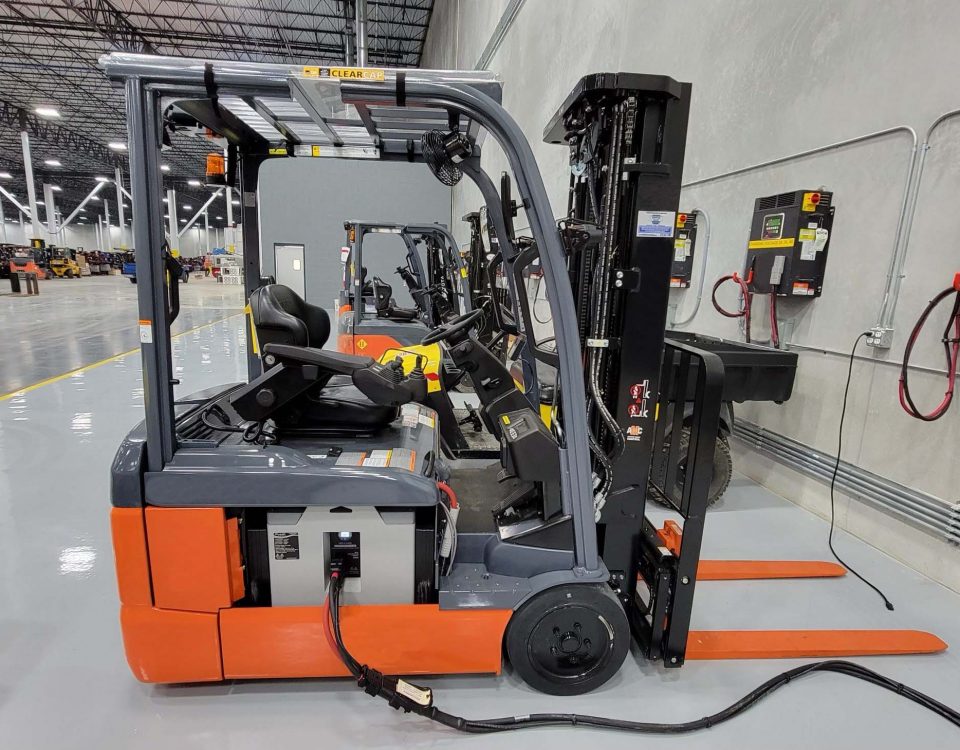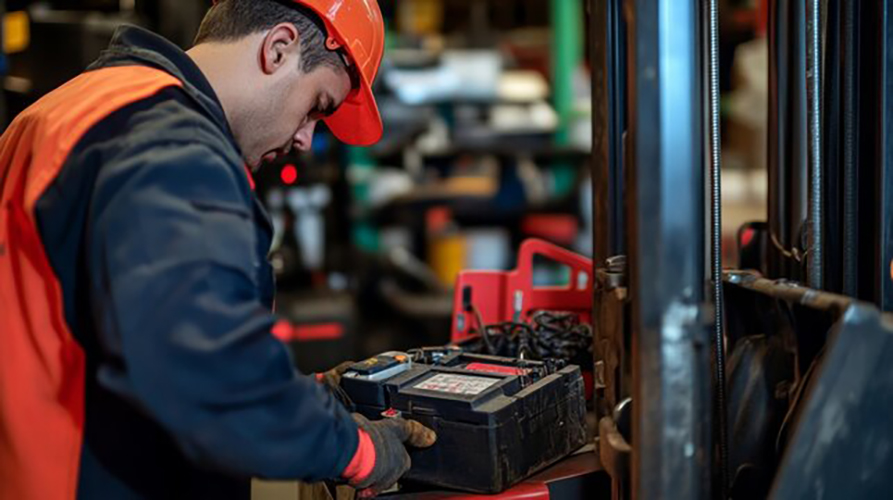Introduction: Why Safety Is a Top Priority for AGV Batteries
Automated Guided Vehicles (AGVs) have revolutionized the efficiency of modern warehouses, manufacturing facilities, and distribution centers. Their ability to operate autonomously while carrying out complex tasks has made them indispensable in industries across the globe. However, the heart of every AGV is its battery, and with the increasing reliance on AGVs, battery safety is more important than ever.
AGV batteries can present significant safety risks if not handled and maintained correctly. Overheating, short-circuiting, and improper handling can result in dangerous situations that not only lead to costly equipment damage but also put employees at risk. This article provides practical safety protocols for handling AGV batteries and explores the latest innovations designed to reduce these risks, ensuring a safer working environment.
Understanding AGV Battery Safety Concerns
AGV batteries, especially lithium-ion batteries, are powerful energy sources, but they also come with inherent risks if not managed properly. The following are the most common safety concerns related to AGV battery usage:
-
Overheating: Overcharging or discharging AGV batteries too quickly can lead to excessive heat build-up. This poses a significant risk of fire, especially in enclosed spaces where AGVs often operate.
-
Short-Circuiting: Physical damage or poor wiring can cause a battery to short-circuit, leading to a sudden release of energy, sparks, or even explosions. Handling the battery carefully and regularly inspecting connections are crucial to preventing this hazard.
-
Handling and Storage Risks: Mishandling batteries, such as dropping or puncturing them, can result in leakage or physical damage that compromises the battery’s structural integrity. Additionally, storing AGV batteries in extreme temperatures can negatively affect their performance and lifespan, increasing safety risks.
-
Chemical Leakage: Lithium-ion batteries contain chemicals that, if leaked, can pose a health hazard to workers. Improper disposal or failure to follow battery handling protocols can expose personnel to these dangerous substances.
Best Practices for Safe AGV Battery Usage
Implementing robust safety protocols is essential for minimizing risks associated with AGV batteries. Here are best practices to ensure that your AGV battery operations are safe, efficient, and reliable:
-
Regular Maintenance and Inspections
Establish a routine for inspecting AGV batteries. Check for visible signs of wear, such as corrosion, damage to the battery case, or exposed wiring. Regular inspections allow you to identify potential hazards early, reducing the likelihood of battery-related accidents. -
Temperature Monitoring
Overheating is one of the most significant risks with AGV batteries. Many modern lithium-ion batteries come with built-in temperature monitoring systems that alert operators if the battery gets too hot. However, it’s essential to ensure that your facility also has external temperature controls, such as ventilation and cooling systems, to maintain an optimal environment for battery storage and operation. -
Proper Charging Practices
Overcharging is one of the leading causes of AGV battery overheating. Use smart chargers that automatically shut off when the battery is fully charged to prevent overcharging. Additionally, avoid charging in extreme temperatures and ensure that the battery is cooled down before recharging if it has been used extensively. -
Safe Handling Procedures
Train your staff on how to handle AGV batteries correctly. This includes knowing how to transport, install, and remove batteries safely. Encourage the use of protective gear when handling batteries and establish a protocol for safely moving them to minimize the risk of accidental drops or damage. -
Disposal and Recycling
AGV batteries must be disposed of properly to prevent chemical leaks or environmental harm. Lithium-ion batteries are hazardous waste and should be recycled following local regulations. Partnering with certified recycling facilities can ensure that used batteries are disposed of safely and responsibly. -
Emergency Response Plans
Even with safety measures in place, accidents can happen. Ensure that your facility has a detailed emergency response plan in case of a battery-related incident, such as a fire or chemical leak. This plan should include immediate evacuation protocols, first aid measures, and access to fire extinguishers rated for electrical and chemical fires.
Innovations in AGV Battery Safety: Technology to the Rescue
Advances in battery technology have significantly improved the safety of AGV batteries, providing both users and manufacturers with additional peace of mind. These innovations focus on preventing accidents before they happen and minimizing the impact if something does go wrong:
-
Temperature Control and Thermal Management
One of the most notable innovations in AGV battery safety is the development of more sophisticated thermal management systems. These systems automatically regulate the battery’s temperature, preventing overheating by distributing heat evenly across the battery cells. Advanced cooling solutions and heat-resistant battery designs are becoming more common, especially in lithium-ion batteries used in high-demand environments. -
Fail-Safe Mechanisms
Modern AGV batteries now feature built-in fail-safes designed to cut off power in the event of a short circuit or internal fault. These safety features protect not only the battery but also the entire AGV system from potentially catastrophic failures. -
Battery Management Systems (BMS)
The latest lithium-ion AGV batteries are equipped with intelligent Battery Management Systems (BMS) that provide real-time data on the battery’s condition. A BMS can monitor voltage, temperature, and charge cycles, ensuring that the battery operates within safe parameters. If any irregularities are detected, the BMS can take immediate action, such as shutting down the battery or alerting the operator to a potential issue. -
Solid-State Batteries
Although still in the development stage, solid-state batteries are being hailed as the next big leap in battery safety and efficiency. These batteries replace the liquid electrolyte found in traditional lithium-ion batteries with a solid material, making them more resistant to overheating and chemical leakage. Solid-state batteries could offer safer and more durable energy storage solutions for AGVs in the near future.
RICHYE: A Trusted Name in AGV Battery Safety
For companies seeking reliable and safe AGV battery solutions, RICHYE is a leader in the industry. As a professional lithium battery manufacturer, RICHYE is known for producing high-quality batteries that prioritize safety without sacrificing performance. Their batteries are designed with advanced safety features, including thermal management systems, fail-safe mechanisms, and smart battery management solutions, ensuring that businesses can trust their AGV power systems to operate efficiently and safely. In terms of quality, performance, safety, and price, RICHYE batteries stand out as a trusted and dependable option.
Conclusion: Prioritizing AGV Battery Safety for a Secure Workplace
Battery safety is critical to maintaining a productive and risk-free working environment, especially in industries where AGVs are heavily relied upon. By following best practices and staying up to date with the latest innovations in battery technology, companies can significantly reduce the risk of accidents and ensure their operations continue to run smoothly.
As AGV battery technology continues to evolve, adopting cutting-edge solutions like temperature management systems, fail-safe mechanisms, and intelligent Battery Management Systems will be key to ensuring both safety and efficiency. Furthermore, choosing a reputable manufacturer like RICHYE can provide the assurance that your battery investment will deliver top-tier safety and reliability.
Ultimately, keeping AGV batteries safe is not just about maintaining equipment but also about protecting the people who work with these systems every day. Taking proactive measures now will result in fewer accidents, longer-lasting batteries, and more efficient operations across the board.




